astroturfing
Latest
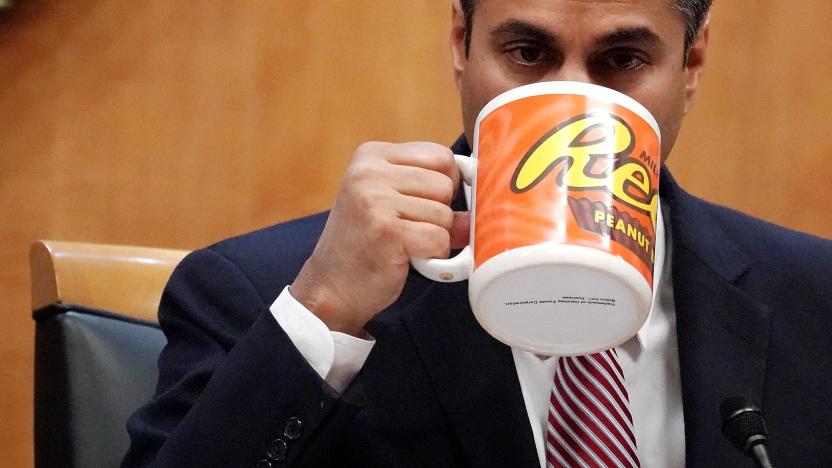
FCC ordered to provide IP addresses tied to fake net neutrality comments
The FCC will have to hand over IP addresses connected to fake net neutrality comments despite claims of privacy violations.

Big tobacco keeps starting 'grassroots' Facebook campaigns
This article was produced in partnership with Point, a YouTube channel for investigative journalism. Facebook groups like 'Oregonians Against Tax Hikes' and 'No Blank Checks for Colorado' look like citizen groups concerned about taxes. But after a few months running extensive Facebook ad campaigns, they recede with members' petition signatures and personal data. They also happen to be owned and operated by tobacco companies. "[Tobacco companies] create these groups to oppose efforts to pass laws either through legislatures or especially through ballot measures," explains Vince Willmore, Vice President of Communications for the Campaign for Tobacco-Free Kids. "Every time there's a ballot measure to increase a tobacco tax or pass a smoke-free air law, they'll come up with a front group with a great sounding name when it's entirely funded and run by the tobacco companies."

Many of the Brexit Party's Twitter followers appear to be bots
It's not shocking to see Twitter bots latch on to a political campaign, but it's not often they do so soon after a campaign starts -- let alone on a large scale. That appears to be the case with the UK's Brexit Party, however. The no-deal EU withdrawal party is only a few months old, but researchers talking to BuzzFeed News found that many of its Twitter accounts are networks of bots and other inauthentic users. The exact amount isn't clear, but F-Secure's Andy Patel noted that over 8,800 users -- roughly 7 percent of the party's Twitter base -- were both recently recreated and disproportionately responsible for retweeting party material.

FCC received thousands of fake letters supporting NFL's blackout rule
Fake FCC comments aren't just reserved for net neutrality opponents. The Wall Street Journal has discovered that the FCC received about 21,000 identical letters urging the regulator to let the NFL keep its blackout rule, which let it ban cable and satellite airings of home games that weren't sold out when the league blocked local broadcasts. These weren't even subtle attempts, either. In addition to using the identities and email addresses of some people without their consent, the campaign relied on some obviously fake messages -- at last check, Bilbo Baggins was more interested in magic rings than cheering on American football teams.
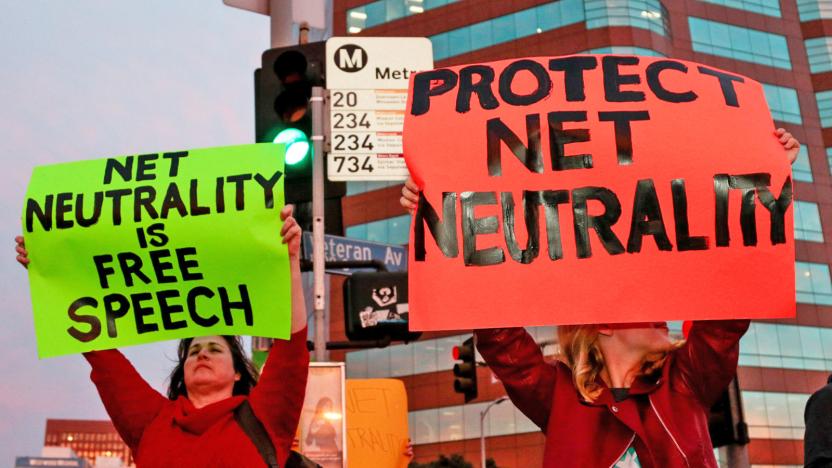
Representatives ask GAO to investigate FCC net neutrality comments
It's not just senators calling for a review of the FCC's millions of fake anti-net neutrality comments. Representatives Elijah Cummings, Greg Meeks and Frank Pallone have sent a letter to the Government Accountability Office asking it to investigate the comments. They want to know the extent of the fakery, which would violate laws barring fraudulent representation in any subject under the executive branch's oversight. And crucially, they also want a look at the FCC's response -- they're "concerned" that it stonewalled New York's investigation by withholding information (at least, until very recently).
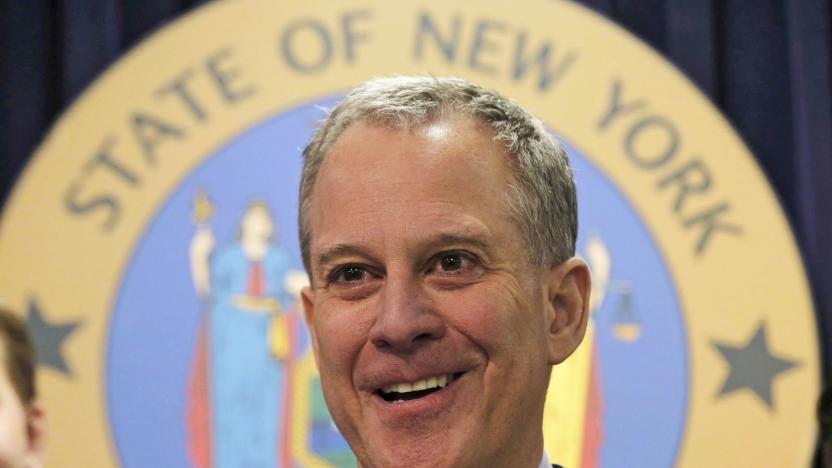
FCC will help New York investigate fake net neutrality comments
To say the FCC has been reluctant to look into the millions of fake comments supporting its decision to kill net neutrality would be an understatement. The Commission did nothing to tackle the issue for months, and repeatedly stonewalled New York state's investigation. At last, though, there might be some progress. New York Attorney General Eric Schneiderman has revealed that the FCC Inspector General's office has "reversed course" and intends to cooperate with the state's inquiry. Just what that cooperation entails isn't clear, but it beats the virtual silence until now.

Over 1.3 million anti-net neutrality FCC comments are likely fakes
It's no secret that bots flooded the FCC with comments supporting its plans to kill net neutrality. But just how many comments were fraudulent? All too many, according to data scientist Jeff Kao. He recently conducted a study that used natural language processing to conclude that "at least" 1.3 million of the anti-net neutrality comments were fakes originating from a central source. They appear to have come from a giant mail merge that made the messages appear superficially unique, but was really just swapping in synonyms for what was clearly the same core statement. The language sounds familiar, too, mimicking that of a giant telecom or lobbying group than everyday people.
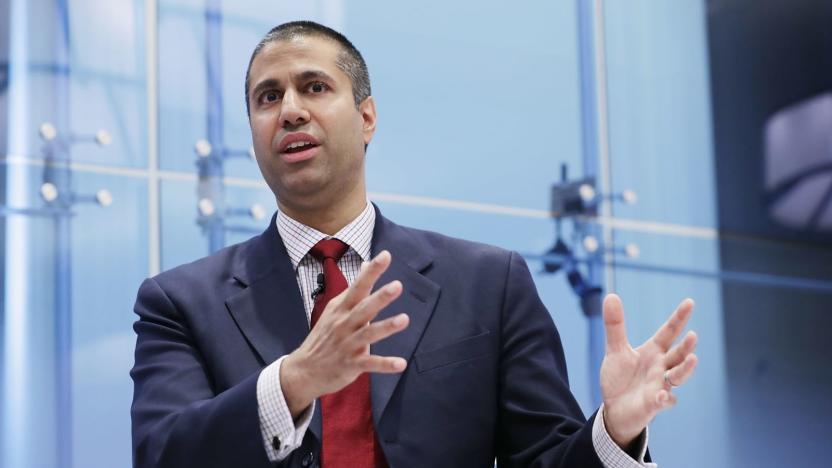
FCC stonewalls demands for evidence of cyberattack
The FCC swears that a denial of service attack hit its servers hours after Last Week Tonight's John Oliver rallied support for net neutrality, but where's the evidence? Well, don't expect it any time soon. In an interview with ZDNet, the regulator's David Bray says the FCC won't release the logs that might show who was responsible for the incident. The logs contain private info like IP addresses, he says. Bray does note that there wasn't a botnet involved, though -- instead, the traffic came from commercial cloud services using the FCC's public programming interface. But if it wasn't a botnet, then who was involved? Some critics are concerned that the FCC isn't exactly being forthright.
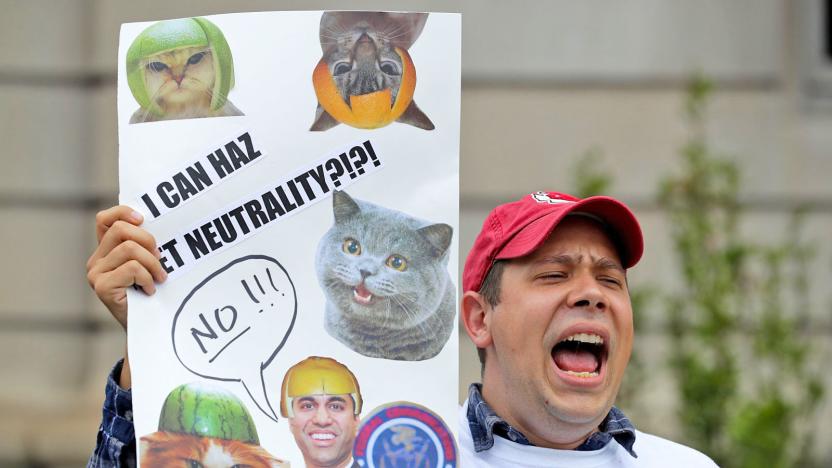
Anti-net neutrality bots are swarming the FCC's comments
It's not just proponents of net neutrality that are flocking to the FCC's website -- opponents are there as well... in a manner of speaking. Reports from ZDNet and elsewhere have revealed that one or more bots are posting thousands of identical comments (at least 128,000) in favor of the FCC's proposal to gut net neutrality rules. The automated code cycles alphabetically through a list of real names and addresses, pretending to support the FCC on their behalf. The agency declined to comment on the bot attack citing a policy where it doesn't discuss specific filings.
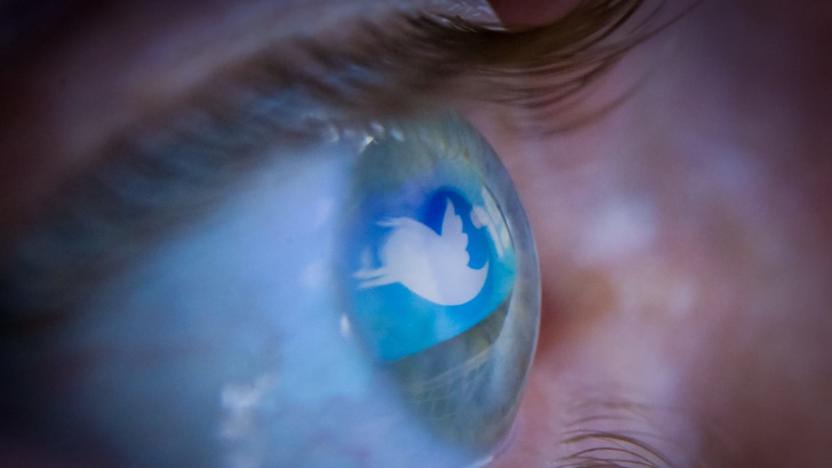
Twitter botnet quotes 'Star Wars' from the middle of the sea
Along with trolls and bullies, one of Twitter's biggest problems is bots -- automated accounts that puff up follower numbers, troll users or turn fake news into trending topics. Researchers investigating botnets found maybe the strangest one ever: 350,000 that tweet only random Star Wars quotes from Windows Phone devices. While that's actually kind of amusing, the researchers say that it reveals "profound limitations of existing bot detection methods" and shows the potential risks that hidden networks pose to the Twitter ecosystem.

Oracle funds a group trying to tarnish Google's image
It won't shock you to hear that Oracle is nursing a grudge after it lost its big copyright case against Google. It's pushing for a new trial, for one thing. However, the software giant is also trying to undermine its rival in roundabout ways. Oracle has confirmed to Fortune that it's funding Campaign for Accountability, a non-profit advocacy group with a decidedly anti-Google bent. While it promotes some common causes, such as fighting "big oil" and promoting LGBT rights, it also has a Google Transparency Project that aims to "track the company's influence" on government and personal lives. And not surprisingly, most of it is critical -- the project is obsessed with the possible ethical implications of Google's White House meetings.

Google lawsuit forces MPAA-backed attorney general to retreat
Remember that post Google put up this week that accused the MPAA of trying to resurrect the spirit of SOPA with the help of state prosecutors (that included evidence based on some of Sony Pictures' leaked emails)? It just turned into a lawsuit -- and it's already having an affect. The search giant has updated the page to explain that it's asking federal courts to dismiss a subpoena Attorney General Jim Hood sent to Google back in October. That 72-page document asserted that he believed that Google has violated the Mississippi Consumer Protection Act, and had failed to take actions to prevent crimes committed by using its services. Now that Google is suing, Hood made a statement via the New York Times, calling for a "time out" and saying he will call the company to "negotiate a peaceful resolution of the issues affecting consumers."

The MPAA is playing politics to help topple Google
Google sees itself as an unbiased index of the web, saying that it only removes results when lawmakers deem them to be illegal. Unfortunately, that's not an argument that holds much sway with the movie studios, still smarting after the heavy-handed Stop Online Piracy Act was shut down. If the New York Times is to be believed, it's prompted the Motion Picture Association of America to use politicians as its newest line of attack. It's a move that even Google has felt compelled to respond to.

Cable companies duped community groups into fighting net neutrality
Last week, it transpired that the big cable companies were bankrolling fake consumer groups like Broadband for America and The American Consumer Institute. These "independent consumer advocacy groups" are, in truth, nothing of the sort, and instead represent the interests of its benefactors, in the fight against net neutrality. If that wasn't bad enough, VICE is now reporting that several of the real community groups (oh, and an Ohio bed-and-breakfast) that were signed up as supporters of Broadband for America were either duped into joining, or were signed up to the cause without their consent or knowledge.

Cable companies are reportedly funding fake consumer groups to attack net neutrality
The public wants net neutrality so badly that it broke the FCC's website. But can the weighty voice of the people combat well-funded astroturfing? VICE believes that the nation's cable companies are funding groups that pretend to represent consumers, but are actually just parroting their own stance to shout down the general public. For instance, the outlet has learned that Broadband for America, which describes itself as a coalition involving "independent consumer advocacy groups," and which counts senator John Sununu amongst its members, is actually funded by the NCTA -- big cable's lobbyists. It's the same situation with the American Consumer Institute, another anti-net neutrality voice of the people, which just happens to receive the bulk of its funding from the CTIA, which represents the US wireless industry. Now, what was the thing our grandma told us about astroturfing? Oh right: if you have to invent spokespeople to represent the other side in the debate, you're probably not the good guys.

Microsoft uses eye tracking to argue that Google distorts search results
Google has already made a few concessions to please European antitrust regulators worried about fair placements in web search results. However, Microsoft doesn't feel those sacrifices are good enough -- and it claims to have scientific proof that more changes are necessary. One of the company's astroturfing outfits, Initiative for a Competitive Online Marketplace, has commissioned an eye-tracking study which suggests that Google's lower-profile sponsored links and map results still draw too much visual attention. "Organic" search results and alternative services get just a fraction of the eyeballs, the Initiative argues. While the data may be of some use to officials, we'd advise taking it with a giant grain of salt -- company-backed studies are rarely objective sources of information.

Taiwan fines Samsung for astroturfing internet comments on its smartphones
Astroturfing (false grassroots) campaigns are usually reserved for promoting unpopular causes, but Samsung apparently disagrees. Taiwan's Fair Trade Commission has just fined the company NT$10 million ($340,333) for marketing its already successful smartphone line through fake internet comments. Samsung allegedly asked third-party contractor Peng Thai to write forum posts that praised devices, trashed competitors and downplayed bad news. The fine is almost trivial for a tech giant that makes billions of dollars in profit per quarter, but it may discourage others who would try similar dirty tricks -- besides, there are plenty of fans who would boost a product for free. [Image credit: Jussi Mononen, Flickr]

WeTab boss Helmut Hoffer caught posting five-star Amazon reviews under fake name, resigns
Uh oh. WeTab's Managing Director, Helmut Hoffer, has just resigned his position after being caught using a fake identity to post positive, five-star reviews for his little MeeGo tablet. Hoffer, who originally faked the WeTab's (then known as the WePad) UI when introducing the tablet to the press, posted a review on Amazon's German site under the name Peter Glaser, a popular member of the Chaos Computer Club. A second glowing review was posted under the name Claudia Kaden -- an account apparently registered to Hoffer's wife. Of course, now that he's been outed, Hoffer admits that it was a mistake not using his own name and says he posted the reviews without the knowledge of the company. Naturally, this isn't the first case of egregious astroturfing that we've seen -- eh hem, Belkin -- and it certainly won't be the last. This guy's just the latest to get caught.%Gallery-104261%




